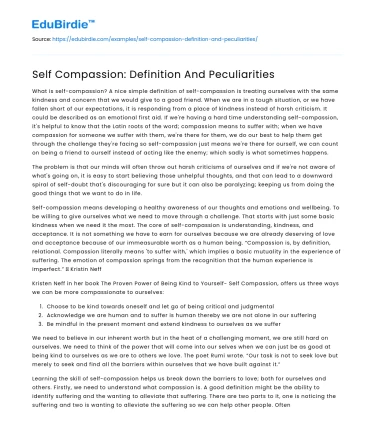What is self-compassion? A nice simple definition of self-compassion is treating ourselves with the same kindness and concern that we would give to a good friend. When we are in a tough situation, or we have fallen short of our expectations, it is responding from a place of kindness instead of harsh criticism. It could be described as an emotional first aid. If we're having a hard time understanding self-compassion, it's helpful to know that the Latin roots of the word; compassion means to suffer with; when we have compassion for someone we suffer with them, we're there for them, we do our best to help them get through the challenge they're facing so self-compassion just means we're there for ourself, we can count on being a friend to ourself instead of acting like the enemy; which sadly is what sometimes happens.
The problem is that our minds will often throw out harsh criticisms of ourselves and if we're not aware of what's going on, it is easy to start believing those unhelpful thoughts, and that can lead to a downward spiral of self-doubt that's discouraging for sure but it can also be paralyzing; keeping us from doing the good things that we want to do in life.
Save your time!
We can take care of your essay
- Proper editing and formatting
- Free revision, title page, and bibliography
- Flexible prices and money-back guarantee
Self-compassion means developing a healthy awareness of our thoughts and emotions and wellbeing. To be willing to give ourselves what we need to move through a challenge. That starts with just some basic kindness when we need it the most. The core of self-compassion is understanding, kindness, and acceptance. It is not something we have to earn for ourselves because we are already deserving of love and acceptance because of our immeasurable worth as a human being. “Compassion is, by definition, relational. Compassion literally means 'to suffer with,' which implies a basic mutuality in the experience of suffering. The emotion of compassion springs from the recognition that the human experience is imperfect.” ― Kristin Neff
Kristen Neff in her book The Proven Power of Being Kind to Yourself- Self Compassion, offers us three ways we can be more compassionate to ourselves:
- Choose to be kind towards oneself and let go of being critical and judgmental
- Acknowledge we are human and to suffer is human thereby we are not alone in our suffering
- Be mindful in the present moment and extend kindness to ourselves as we suffer
We need to believe in our inherent worth but in the heat of a challenging moment, we are still hard on ourselves. We need to think of the power that will come into our selves when we can just be as good at being kind to ourselves as we are to others we love. The poet Rumi wrote. “Our task is not to seek love but merely to seek and find all the barriers within ourselves that we have built against it.”
Learning the skill of self-compassion helps us break down the barriers to love; both for ourselves and others. Firstly, we need to understand what compassion is. A good definition might be the ability to identify suffering and the wanting to alleviate that suffering. There are two parts to it, one is noticing the suffering and two is wanting to alleviate the suffering so we can help other people. Often when we see others suffering, we can identify it, and we want to help, but what about ourselves? Sometimes we can identify our own suffering, but we may be more self-critical of ourselves for having the suffering; almost as if we deserve it
These kinds of soft critical thoughts are not helpful. Having the capacity to alleviate the suffering in ourselves is important because life is hard; from the moment were born until we die. Life can be full of tragedy, of death and disease and problems and heartache and all these kinds of things that come along. Learning to deal with them with self-compassion is important to our health.
“Life is about accepting the challenges along the way, choosing to keep moving forward, and savouring the journey.” - Roy T. Bennett, The Light in the Heart: Inspirational Thoughts for Living Your Bes Life
Practicing saying compassionate things to ourselves like be patient, may I forgive myself, keep trying, you can do hard things, or I love you can build self-compassion. It may be helpful to put our hand on our heart and feel our heart; some people may be afraid to try self-compassion because they think that it's just an excuse for bad behavior or they're afraid that being compassionate toward ourselves might stop them us from trying to improve but self-compassion is not just kind it also helps us do better than next time. Self-compassion does not replace or interfere with change it is not an excuse to make more mistakes; instead, it is the gentle forgiveness that gives us the courage to try again, even if we might fail. Self-punishment on the other hand makes us more fearful and perfectionistic anxious rigid and closed off to trying again. Self-compassion makes us more likely to grow and do better next time. It is so much better to give yourself a break, give yourself some love so that you can build up the courage to try again next time.
Bibliography
- Bennett T Roy 2020 Roy Bennett The Light in the Heart: Inspirational Thoughts for Living Your Best Life
- Germer Christopher (2009) The Mindful Path to Self-Compassion: Freeing Yourself from Destructive Thoughts and Emotions The Guildford Press
- Neff, K., and Germer, C.K. (2018). The mindful self-compassion workbook: a proven way to accept yourself, build inner strength, and thrive. New York, NY: Guilford Press






 Stuck on your essay?
Stuck on your essay?

